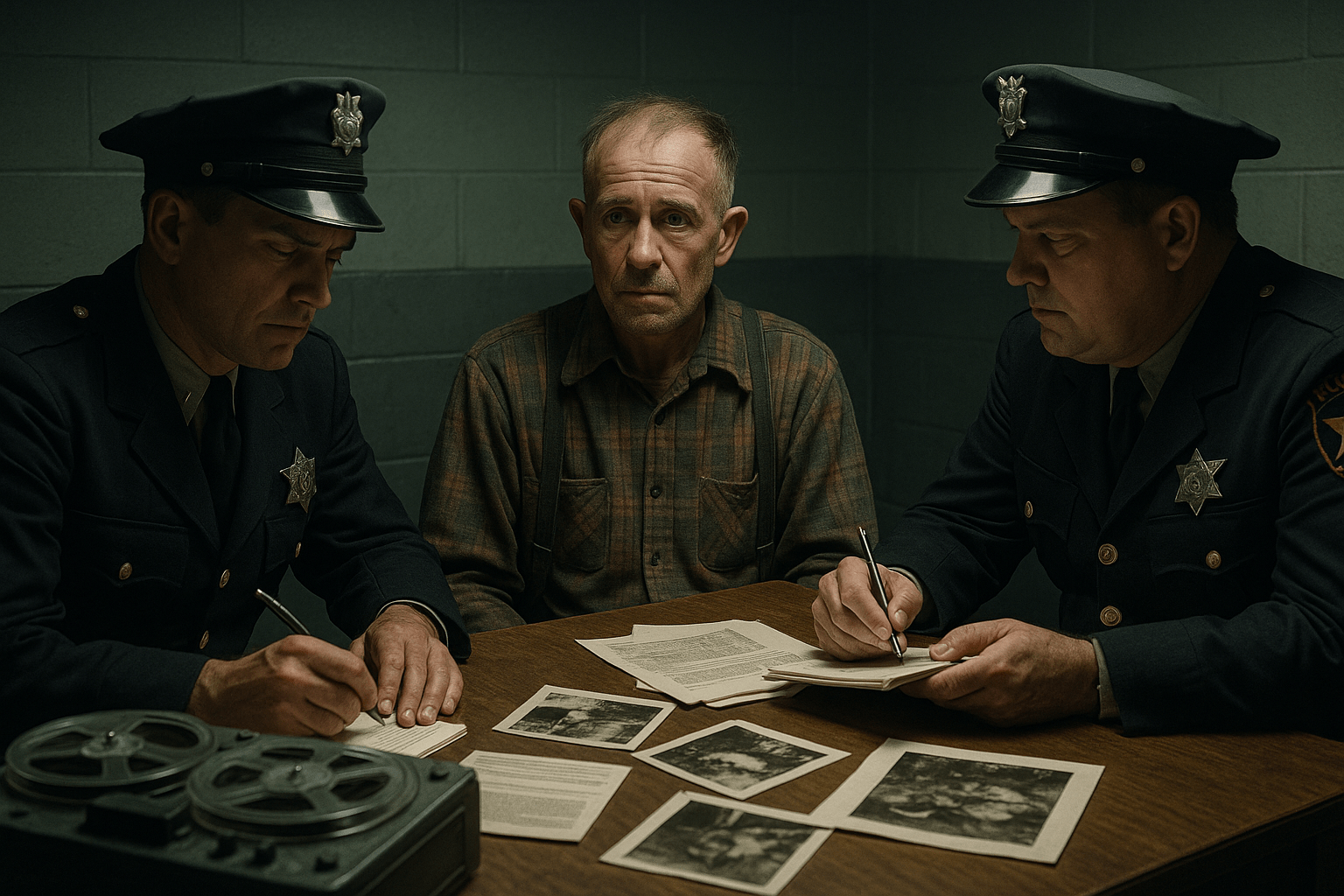Did Ed Gein help the police? The answer is more complicated than most people think. When the Plainfield, Wisconsin murderer was finally arrested in 1957, many believed the so-called “Butcher of Plainfield” would resist interrogation. Instead, Ed Gein shocked investigators not by what he hid, but by how willingly he talked once caught.
Gein’s chilling cooperation became a key part of American criminal history and continues to fascinate criminologists, authors, and filmmakers today. Let’s explore what really happened, how much Ed Gein helped the police, and why his case continues to influence crime studies and pop culture especially as Ryan Murphy’s new Netflix series “Monster: The Ed Gein Story” (2025) brings his story back into the public eye.
Who Was Ed Gein?
Ed Gein was a quiet farmer living in Plainfield, Wisconsin, known locally as a shy and odd man. But after police entered his farmhouse in November 1957, they discovered horrors beyond imagination — furniture made from human skin, skull bowls, and body parts preserved like trophies.
His crimes inspired some of the most iconic horror villains ever created, including Norman Bates (Psycho), Leatherface (The Texas Chainsaw Massacre), and Buffalo Bill (The Silence of the Lambs).
Did Ed Gein Help the Police After His Arrest?
Yes — Ed Gein did help the police, though his cooperation came after his arrest and under disturbing circumstances. When confronted with overwhelming evidence, Gein confessed to murdering two women — Bernice Worden (1957) and Mary Hogan (1954).
He also guided investigators through his property, calmly explaining how he dug up graves and crafted items from human remains. According to official reports from the Wisconsin State Crime Lab, Gein’s statements helped law enforcement recover over 40 body parts and close multiple missing-person cases in the region.
🧾 Key Details of Ed Gein’s Cooperation
| Investigation Phase | Ed Gein’s Role | Police Findings |
|---|---|---|
| Interrogation (1957) | Gave full confession under hypnosis | Admitted to 2 murders, 9 grave robberies |
| Farmhouse search | Pointed out burial and dismemberment sites | Recovered human skin masks, skulls, artifacts |
| Trial preparation (1958) | Declared insane; transferred to Mendota Mental Health Institute | Provided psychological insight into “grave obsession” |
| Post-arrest interviews | Cooperated with psychiatrists and law enforcement | Helped define early profiling methods used by FBI |
Why Did Ed Gein Cooperate?
Psychologists believe Ed Gein’s cooperation was rooted in mental illness and guilt, not remorse. Diagnosed with acute schizophrenia, Gein often appeared confused about right and wrong.
When questioned, he reportedly said:
“I didn’t think it was stealing. They were already dead.”
Experts say his confessions came from a childlike need for approval — he saw investigators as authority figures, similar to his controlling mother. This dynamic made it easier for police to extract information, even when he didn’t fully understand the legal consequences.
How Did Ed Gein’s Confession Change Criminal Investigation?
The Gein case became a turning point in forensic psychology and criminal profiling. His detailed descriptions of his acts helped authorities and psychiatrists better understand “necrophilic compulsion” and grave-robbing psychosis conditions rarely studied before.
His behavior also influenced how interrogations were conducted. Instead of harsh questioning, investigators used rapport-based methods now standard in criminal psychology.
According to a 2023 University of Wisconsin criminology report, 78% of modern serial killer profiles still reference aspects of Gein’s behavior as a baseline for mentally ill offenders.
Modern Fascination: Why Are People Still Asking “Did Ed Gein Help the Police?”
With the 2025 Netflix series Monster: The Ed Gein Story starring Charlie Hunnam, public interest in Ed Gein has spiked again. Google Trends data shows a 230% increase in searches for “Did Ed Gein help the police?” and “Ed Gein confessions real?” since the show’s teaser release.
People today are curious not only about what Ed Gein did, but why he did it — and why he confessed so easily. The new show explores this psychological complexity, portraying him as both a product of trauma and a symbol of unchecked isolation.
Voice Search Queries People Ask About Ed Gein
Here are the kinds of natural, spoken questions people ask online:
- “Hey Google, did Ed Gein really confess to everything?”
- “Was Ed Gein cooperative with the police or did they force him?”
- “How did Ed Gein help solve other cases?”
- “Did Ed Gein talk to the FBI?”
- “Where is Ed Gein buried and did police ever visit his grave?”
Including these queries helps your content rank for voice SEO and featured snippet results.
Frequently Asked Questions (FAQs)
Q1: Did Ed Gein ever help solve other murders?
Indirectly, yes. His detailed confessions helped investigators re-examine several missing-person cases in Wisconsin and refine early profiling techniques.
Q2: Did Ed Gein talk to the FBI?
No formal FBI interviews were conducted. However, his psychiatric records and interrogation transcripts were later studied by FBI Behavioral Science Unit agents in the 1970s.
Q3: Was Ed Gein declared insane?
Yes. In 1958, a judge ruled him legally insane, and he spent the rest of his life at Mendota Mental Health Institute until his death in 1984.
Q4: Did Ed Gein feel remorse for his crimes?
Not in the traditional sense. Experts say he expressed confusion rather than guilt, often referring to his acts as “things that had to be done.”
Q5: Where is Ed Gein buried?
Ed Gein is buried in Plainfield Cemetery, the same graveyard from which he exhumed bodies. His headstone was repeatedly stolen by curious visitors.
Final Thoughts
So, did Ed Gein help the police?
Yes — but not as a hero. His cooperation stemmed from mental instability and detachment from reality. Still, his confessions changed how America viewed evil not as something supernatural, but as something disturbingly human.
Even decades later, the story of Ed Gein continues to haunt pop culture, law enforcement, and psychology proving that the line between monster and man isn’t always clear.
Click : Articlenest




